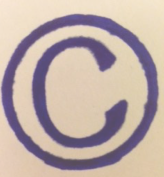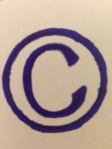Asking what copyright protects is a great question! Thanks, Eddie, for asking me  yesterday in a blog comment. You have inspired this post.
yesterday in a blog comment. You have inspired this post.
Copyright is a form of intellectual property law that protects “original works of authorship” including literary, musical, artistic and dramatic works, such as photographs, articles, novels, sound recordings, sheet music, lyrics, jewelry designs, artwork, graffiti, poetry, screen plays, children’s books, user manuals, website content, movies, computer software, and architecture. [THE KEY is that the material (or work) is ORIGINAL].
Can I copyright a name, title, slogan, or short phrase? In most cases, No. These things may be protected as trademarks. However, copyright protection may be available for logo artwork. In some circumstances, an artistic logo may also be protected as a trademark.
Can I copyright the name of my band? No. Names are not protected by copyright law. Some names may be protected under trademark law.
Can I copyright my domain name? No. Domain names are not protected by copyright law. Some domain protection may be available under trademark law.
Can I copyright my idea? No. Copyright does not protect ideas, concepts, systems, or methods of doing something. You may express your ideas in writing or drawings and claim copyright in your description (for example, a user manual), but be aware that copyright will not protect the idea itself as revealed in your written or artistic work.
Excerpt from the U.S Copyright Office at: www.copyright.gov/help/faq/faq-protect.html.
See also: “How to write a © Copyright Notice and Why to Use it” at http://wp.me/p10nNq-18; blog posts on trademarks and trademark registration at https://iplegalfreebies.wordpress.com/category/t-r-a-d-e-m-a-r-k; “Copyright Basics” at www.copyright.gov/circs/circ01.pdf ; “Copyright Protection Not Available for Names, Titles, or Short Phrases” at www.scireg.org/us_copyright_registration/circs/circ34.pdf ; @iplegalfreebies and www.kasterlegal.com.
